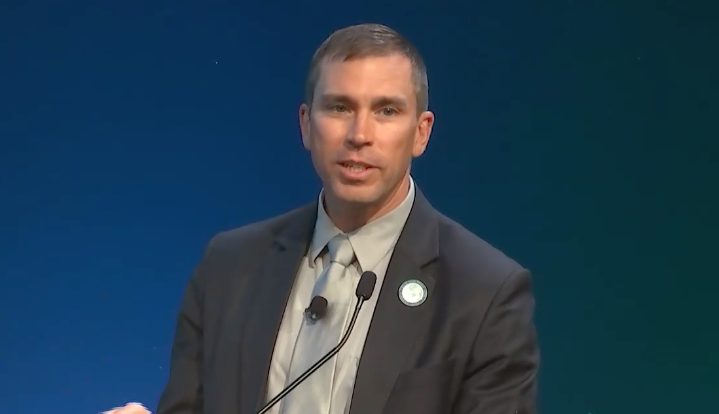Latest News

SDA Director Derek Tournear speaking at MilSat Symposium on Oct. 23 hosted by SatNews. Screenshot
The Space Development Agency has selected 19 space companies to be a part of a hybrid acquisition pool known as HALO to compete for demonstrations for the Proliferated Warfighter Space Architecture (PWSA) constellation.
The HALO pool is a contracting vehicle that allows the SDA to solicit prototypes and experimentations from non-traditional space companies and then open the door for those companies to compete for mainline PWSA tranche contracts.
The 19 companies selected are: Airbus U.S. Space & Defense; Apex Technology; AST Space Mobile; Astro Digital; Capella Space; CesiumAstro; Firefly Aerospace; Geneva Technologies; Impulse Space; Kepler Communications; Kuiper Government Solutions; LeoStella; Momentus Space; Muon Space; NovaWurks; SpaceX; Turion Space; Tyvak Nano-Satellite Systems; and York Space Systems.
The PWSA is a constellation of satellites in Low-Earth Orbit (LEO) for missile warning and tracking, sending data via a transport layer of satellites. The SDA is taking a spiral development approach, launching new tranches every two years.
HALO is a response to the critique that the SDA could end up with vendor lock on its mainline tranches by prioritizing schedule and price, where only a small group of performers will be able to secure contracts for the tranches, SDA Director Derek Tournear explained, speaking at MilSat Symposium hosted by SatNews in Mountain View, California on Oct. 23.
“We want to be able to get capabilities demonstrated rapidly,” Tournear said. “We want to be able to move new vendors from ‘We think you might be able to do it,’ — to ‘Now we have confidence that you could actually bid and win on one of the mainline tranches.’”
The SDA received more than 40 proposals for HALO and awarded 19 contracts. HALO is an other transactions agreement (OTA), modeled after an indefinite-delivery-indefinite-quantity (IDIQ) approach. Each member will receive an initial agreement valued at $20,000 for administrative and travel expenses and is now eligible to compete for demonstration prototype task orders.
Only vendors in the HALO pool will be able to bid against future specific demonstration prototype orders. Missions awarded under HALO will be executed by the vendor, not a mission integrator. The focus will be on rapid prototypes, without the full controls of a typical contract, allowing the SDA to take more risks, Tournear said.
“It doesn’t have to have all the bells and whistles [of] a true operational system. We want it fielded rapidly,” he said. “Essentially it’s a quick and dirty demo, versus a real operational system.”
He explained one example of a task order mission is to demonstrate a “space exchange point,” or a satellite that can translate, or connect to an SDA satellite, a SpaceX Starlink satellite and an Amazon Kuiper satellite.
The SDA plans to allow new companies to on-ramp into HALO. “This is not a one and done,” Tournear said. “There’s always a chance for you to be on-ramped in the future as the technology matures, as different things change. This is going to be very dynamic.”
Although the SDA said the HALO pool is for “non-traditional space companies,” a number of the companies already work with the SDA. SpaceX, Tyvak, and York Space Systems have already received prime contracts.
Astro Digital built the first two satellites launched by the SDA in the Mandrake 2 mission that started under DARPA Blackjack. And Airbus U.S. Space and Defense and CesiumAstro are subcontractors on tranche contracts.
LeoStella announced Thursday that the company will work with BlackSky on bids for HALO task orders. LeoStella is a joint venture between BlackSky and Thales Alenia Space.
LeoStella board member and BlackSky COO Nick Merski called HALO an “integral tool” for the SDA to engage with the commercial industry. “We appreciate SDA’s innovative approach to acquisition problem solving. This contract enables users to combine industry innovation and apply it to current and future SDA mission needs on mission-ready timelines,” Merski commented in a release.
Get the latest Via Satellite news!
Subscribe Now